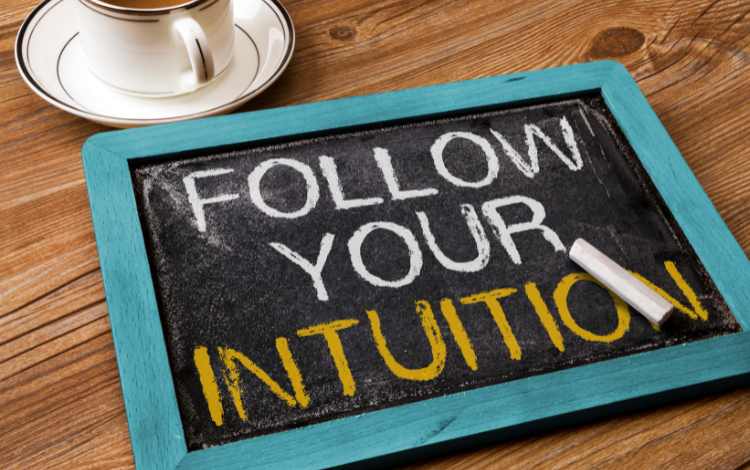
Intuition: Thinking without thinking.
Thinking is an integral part of our daily lives. We analyze, reason, and deliberate to make decisions and solve problems. However, there are instances when our minds bypass this conscious thinking process and arrive at immediate conclusions or insights.
This phenomenon is often called “thinking without thinking” and has fascinated philosophers, psychologists, and scientists for centuries.
Browse our online courses on meditation, positive thinking, overcoming procrastination, confidence, and freedom from distractions.
In this blog post, we will explore the concept of thinking without thinking and delve into the intriguing world of intuition.
Understanding Intuition
Intuition is often described as a gut feeling or an instinctive hunch that arises without conscious deliberation.
It is a form of rapid cognition that allows us to make split-second decisions or arrive at accurate assessments without fully understanding the reasoning behind them.
In his book “Blink: The Power of Thinking Without Thinking,” Malcolm Gladwell aptly describes intuition as “the power of knowing in an instant.”
Intuition can manifest in various ways, such as a sudden insight, a strong feeling, or a tingling sensation. It can guide us in various aspects of life, including personal relationships, creative endeavors, and even high-stakes situations like business or sports.
The Science Behind Intuition
While intuition may seem mysterious and magical, research has shed light on the underlying mechanisms that enable our minds to engage in thinking without thinking.
The brain processes vast amounts of information constantly, and intuition results from this rapid information processing combined with our past experiences and knowledge.
Neuroscientists have discovered that the brain can make incredibly accurate assessments based on subtle cues and patterns our conscious mind might overlook. These assessments are often formed in the blink of an eye, drawing on our subconscious knowledge and past experiences stored in our memory.
Gladwell’s book explores numerous studies and real-life examples that demonstrate the power of intuition. One such study involved examining the ability of art experts to determine the authenticity of artwork.
Researchers discovered that these experts could make accurate judgments within seconds of viewing a painting despite being unable to explain their reasoning. They have honed their intuition through years of experience and exposure to various artistic styles and techniques.
Intuition, Hunches and Gut Feeling
Intuition, often referred to as our “gut feeling” or inner wisdom, has the remarkable capacity to provide us with valuable guidance in the complex journey of life.
It is an innate, subconscious understanding that draws from our accumulated knowledge, experiences, and emotions.
Intuition can manifest as a hunch, a fleeting thought, or an unexplainable sense of knowing. It offers a unique perspective, often transcending logical reasoning, which can be particularly useful when faced with difficult decisions or ambiguous situations.
It is this mystical quality that allows intuition to provide us with insights and direction that may elude the conscious mind.
By learning to trust and tune into our intuitive impulses, we can navigate life’s uncertainties with a heightened sense of assurance, ultimately making better choices that align with our authentic selves.
Intuition serves as a guiding compass in both personal and professional realms. Leaders who listen to their intuitive wisdom make innovative decisions that lead to success in business.
In personal relationships, intuitive insights can help us understand the needs and feelings of others, fostering deeper connections and empathy.
Harnessing Intuition
Although intuition can provide valuable insights, it is essential to acknowledge that it is not infallible. There are instances when bias, stereotypes, or emotional influences may cloud our intuitive judgments.
Balancing relying on intuition and engaging in deliberate, analytical thinking when the situation calls for it is crucial.
To harness the power of intuition effectively, we can cultivate a few essential practices:
Cultivate self-awareness: Pay attention to your intuitive feelings and differentiate between genuine intuition and mere speculation or emotion-driven impulses.
Seek experience: Engage in activities that expose you to a wide range of situations, enabling your subconscious mind to accumulate valuable knowledge and patterns.
Trust your instincts: When faced with a decision or a problem, allow yourself to tap into your intuition. Trust that your subconscious mind has processed relevant information and can guide you towards a suitable solution.
Validate intuition: Whenever possible, gather additional information to confirm or challenge your intuitive insights. This practice helps develop a deeper understanding of the factors influencing your intuition.
Thinking Without Thinking and Using intuition
Thinking without thinking or relying on intuition is a fascinating aspect of human cognition. It is a product of our brain’s remarkable ability to process vast amounts of information and draw upon past experiences to arrive at rapid judgments.
While intuition can provide valuable insights, you should use it with deliberate thinking to ensure well-rounded decision-making.
By embracing our intuition and understanding its strengths and limitations, we can unlock new perspectives, make more informed choices, and navigate life’s complexities with greater clarity and confidence.
Harnessing intuition involves developing a keen sensitivity to one’s emotions and a willingness to silence the noise of external influences and rational thought when necessary.
Next time you have a gut feeling or a hunch, pay attention to it – your mind might be trying to tell you something important.
Browse our online courses on meditation, positive thinking, overcoming procrastination, motivation, confidence, and freedom from distractions.


